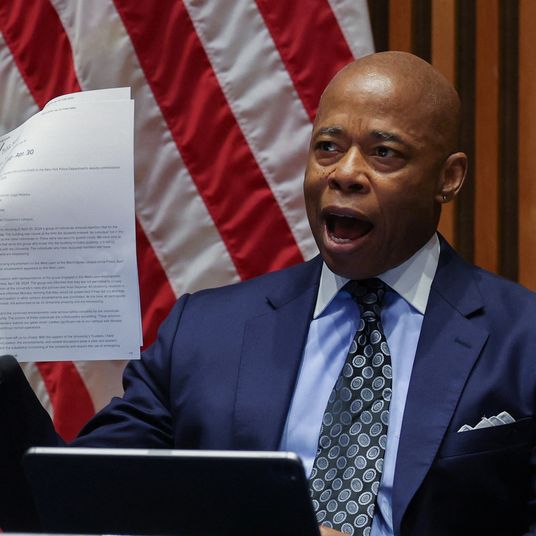
With eight days left before November 3, any account of the trajectory of the presidential contest that isn’t just pro-Trump spin would have to concede that the president is still trailing Biden nationally and in the key battleground states, with time running out and no particular reason to think Trump has momentum on his side, unless you really put a lot of stock in boat parades.
There is, however, an argument underway among data dogs as to whether the presidential race is in some small way tightening, and there’s some evidence it is in national polls (Biden’s lead in the FiveThirtyEight polling averages has dropped from 10.7 on October 17 to 9.4 percent now) and in some battleground states (e.g., Florida, where in the same averages the Biden lead has been cut in half from 4.6 percent on October 7 to 2.3 percent now).
But if the Biden lead is still robust, does it really matter whether it’s gradually shrinking?
There are three reasons to answer “yes.”
The size of Biden’s lead affects down-ballot contests
With a President Biden really needing a Democratic Senate, and Democrats needing a net gain of four seats outside Alabama, where they are very likely to lose an incumbent, there really isn’t much of a margin for error. A big Biden win could not only decide very close Senate races in Iowa, Maine, North Carolina, and Georgia (two races!) in Democrats’ favor, but could even sweep away Republican seats in Alaska, Kansas, Montana, and South Carolina in the tide. You could be looking at the kind of haul Republican famously bagged in 1980 in which they carried every close state in the wake of an unexpectedly large Reagan presidential landslide. But if Biden’s national margin shrinks just enough, Republicans could hang onto the Senate and make Biden’s presidential honeymoon vanish.
Biden’s margin could also affect the outcome in House races, where small Democratic gains are currently expected, but could become even smaller or much larger depending on what happens at the top of the ticket. And lest we forget, there are a number of state legislative chambers up for grabs which will have an impact on redistricting, and thus the future shape of both House and state legislative districts for the next decade.
A shrinking Biden lead could be vulnerable to polling errors
Memories of how far off national polls were in 2016 are often faulty; according to FiveThirtyEight’s analysis, national polls missed by an average of 3.1 percent. The average state polling error was a more significant — and ultimately more important — 5.2 percent. Biden’s current lead is less than 5.2 percent in Arizona, Florida, Georgia, Iowa, North Carolina, and Pennsylvania. If Trump won all those states plus the ones where he is currently leading, he’d have 280 electoral votes and a second term. Is it likely? No. Is it worth knowing how unlikely it is? Absolutely.
A big Biden win could avoid a contested election
As some of us have been warning for months, there is a significant risk that the split between Democrats voting by mail and Republicans voting on Election Day could tempt Trump to declare victory on the basis of partial Election Night results and then begin fighting to suppress a full count of Democratic-tilting late-arrival mail ballots. A robust Biden showing in certain battleground states that count ballots quickly could frustrate any “red mirage” scheme. As Greg Sargent notes, Florida could fit the bill:
Because Florida’s voting rules permit mail ballots to be counted well in advance of Election Day, an election night call here is likely.
This means avoiding a scenario in which Trump declares himself winner even as enormous numbers of mail ballots remain outstanding in key states. Since Trump has no plausible path without Florida, it would probably mean a winner is called on election night.
Also: Because Florida has had years of experience using mail balloting, a process often run by Republicans, it will be much harder to contest the result with “voter fraud” lies.
Greg makes the same argument about Arizona, another quick-count state that Trump really needs to win.
It wouldn’t take much of a tightening of the race in either state, though, to make a Biden call on Election Night unlikely, or even to flip them into the Trump column. Once the contest slips into a netherworld of slowly reported mail ballots, with Republicans doing everything possible to stop or skew the count, all bets for an uncontested election could be off.
So yes, even if you believe Trump’s done, it may matter a great deal exactly how well done he ends up, and exactly how certain that is.






























